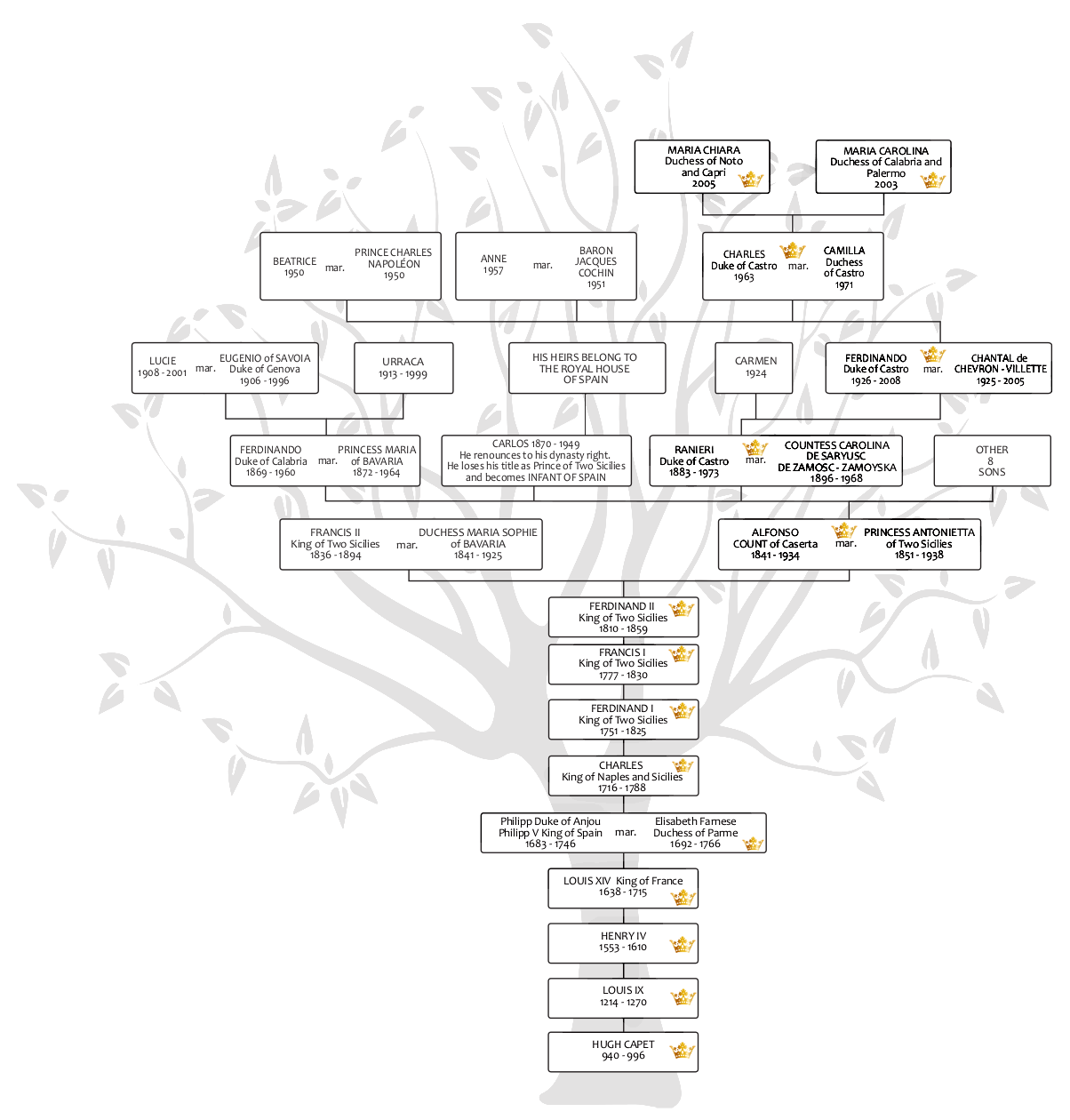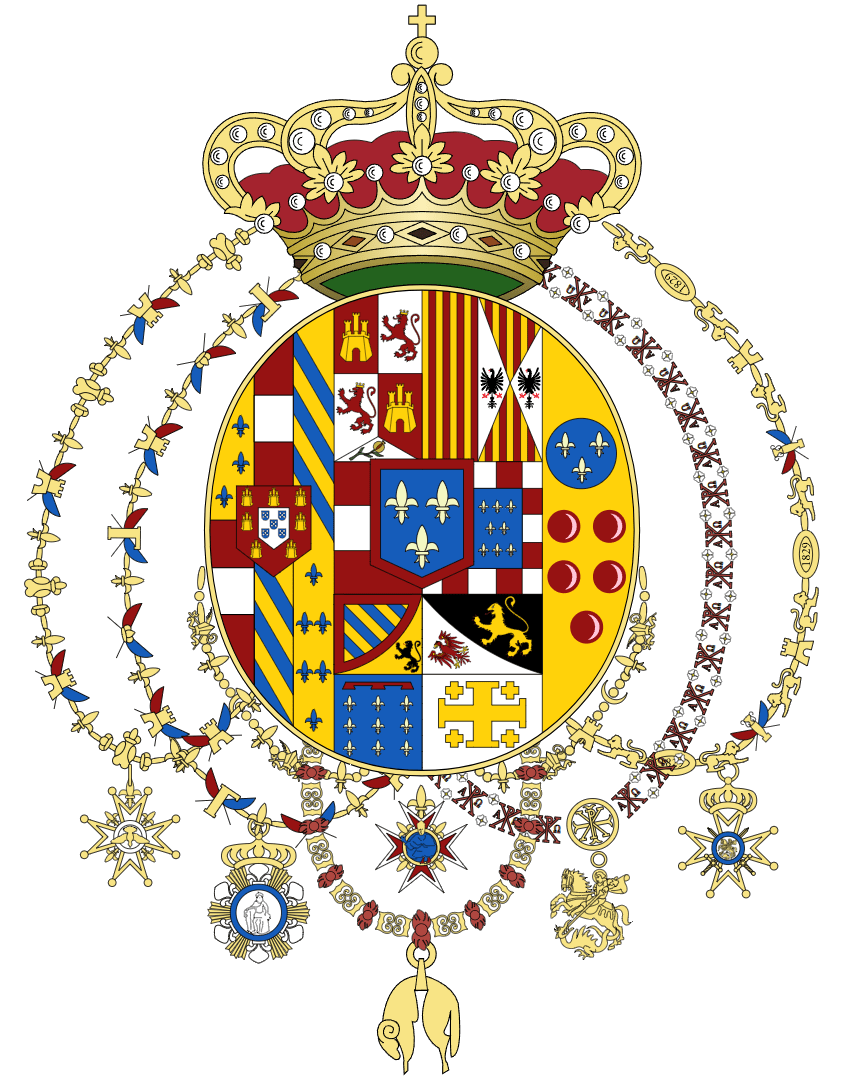Prince Jaime of Bourbon-Two Sicilies, the Duke of Noto, is set to tie the knot with Lady Charlotte Diana Lindesay-Bethune in a grand ceremony in Palermo, Italy, in September 2021. This union marks a significant milestone, as it will take place ninety years after the 1931 nuptials of the Count and Countess of Paris, the groom's great-grandparents, in the same location.
The wedding of the eldest child of Prince Pedro, Duke of Calabria, and the youngest child of the 16th Earl of Lindsay will be celebrated in the historic Cathedral of Palermo. The reception will follow at the Palazzo dei Normanni, a majestic palace that has witnessed numerous royal weddings and events throughout history. This union promises to be a grand celebration of love and tradition, bringing together two esteemed families from Europe's royal circles[1].
what are the key historical events that have shaped the Bourbon-Two Sicilies family

- The Spanish Succession and the War of the Spanish Succession (1700-1714): The Bourbon dynasty was established in Spain when Philip V, a grandson of Louis XIV of France, became the King of Spain. This led to the War of the Spanish Succession, which saw the Bourbon family gain control over the Spanish throne and the Kingdom of Naples and Sicily.
- The French Revolution and the Napoleonic Wars (1789-1815): The French Revolution led to the invasion of Southern Italy by French troops, causing the Bourbon monarchs to flee to Palermo under British protection. The restoration of the monarchy in 1799 was followed by another French invasion, resulting in the creation of the Kingdom of the Two Sicilies in 1816.
- The Unification of Italy (1860-1861): The Kingdom of the Two Sicilies was eventually unified with the rest of Italy under the House of Savoy, marking the end of the Bourbon dynasty's rule over the region.
- The Restoration of the Spanish Monarchy (1975): The Bourbon dynasty regained the Spanish throne after a period of republican rule, ensuring the continuation of the family's royal lineage.
- The Succession Dispute (1960s-Present): The succession of the House of Bourbon-Two Sicilies has been disputed between the senior Calabrian line and the junior Castro line, with ongoing disagreements over the traditional male-line succession.
what were the major challenges faced by the Bourbon-Two Sicilies during the French invasion of 1799

- Loss of Control: The French invasion led to the loss of control over the mainland, forcing the Bourbons to flee to Sicily, where they maintained a stronghold.
- French Rule: The French occupied Naples and introduced significant reforms, including the abolition of feudalism, the introduction of the Napoleonic Code, and the suppression of religious houses. These changes were deeply resented by the local population.
- Resistance and Counter-Revolution: The French occupation sparked resistance and counter-revolutionary movements, including the Neapolitan Republic, which was brutally suppressed by the Royal Terror.
- Economic Strains: The war and the subsequent French occupation placed significant economic strains on the kingdom, leading to financial difficulties and the eventual bankruptcy of the monarchy.
- Loss of Autonomy: The French invasion and subsequent rule led to the loss of autonomy for both Naples and Sicily, which were eventually unified under the Kingdom of the Two Sicilies in 1816.
how did the French invasion of 1799 affect the internal structure of the Kingdom of the Two Sicilies
- Loss of Control: The French invasion led to the loss of control over the mainland, forcing the Bourbons to flee to Sicily, where they maintained a stronghold.
- French Rule: The French occupied Naples and introduced significant reforms, including the abolition of feudalism, the introduction of the Napoleonic Code, and the suppression of religious houses. These changes were deeply resented by the local population.
- Resistance and Counter-Revolution: The French occupation sparked resistance and counter-revolutionary movements, including the Neapolitan Republic, which was brutally suppressed by the Royal Terror.
- Economic Strains: The war and the subsequent French occupation placed significant economic strains on the kingdom, leading to financial difficulties and the eventual bankruptcy of the monarchy.
- Loss of Autonomy: The French invasion and subsequent rule led to the loss of autonomy for both Naples and Sicily, which were eventually unified under the Kingdom of the Two Sicilies in 1816.
 |
| Prince Jaime of Bourbon-Two Sicilies and Lady Charlotte Lindesay-Bethune |
Prince Jaime of Bourbon-Two Sicilies, Duke of Noto, and Lady Charlotte Diana Lindesay-Bethune will marry in Palermo in September 2021. Their union will take place ninety years after the 1931 nuptials of the Count and Countess of Paris, the groom's great-grandparents, and in the same location.
 |
| Jaime and Charlotte with Gianfranco Miccichè |
 The wedding of the eldest child of Prince Pedro, Duke of Calabria, and the youngest child of the 16th Earl of Lindsay will be celebrated in the Cathedral of Palermo. The wedding reception will take place at the the Palazzo dei Normanni.
The wedding of the eldest child of Prince Pedro, Duke of Calabria, and the youngest child of the 16th Earl of Lindsay will be celebrated in the Cathedral of Palermo. The wedding reception will take place at the the Palazzo dei Normanni.#EANF#
- The Spanish Succession and the War of the Spanish Succession (1700-1714): The Bourbon dynasty was established in Spain when Philip V, a grandson of Louis XIV of France, became the King of Spain. This led to the War of the Spanish Succession, which saw the Bourbon family gain control over the Spanish throne and the Kingdom of Naples and Sicily.
- The French Revolution and the Napoleonic Wars (1789-1815): The French Revolution led to the invasion of Southern Italy by French troops, causing the Bourbon monarchs to flee to Palermo under British protection. The restoration of the monarchy in 1799 was followed by another French invasion, resulting in the creation of the Kingdom of the Two Sicilies in 1816.
- The Unification of Italy (1860-1861): The Kingdom of the Two Sicilies was eventually unified with the rest of Italy under the House of Savoy, marking the end of the Bourbon dynasty's rule over the region.
- The Restoration of the Spanish Monarchy (1975): The Bourbon dynasty regained the Spanish throne after a period of republican rule, ensuring the continuation of the family's royal lineage.
- The Succession Dispute (1960s-Present): The succession of the House of Bourbon-Two Sicilies has been disputed between the senior Calabrian line and the junior Castro line, with ongoing disagreements over the traditional male-line succession.
The article highlights the upcoming wedding of Prince Jaime of Bourbon-Two Sicilies, the Duke of Noto, and Lady Charlotte Diana Lindesay-Bethune, which will take place in Palermo, Italy, in September 2021. This union marks a significant milestone, as it will occur ninety years after the 1931 nuptials of the Count and Countess of Paris, the groom's great-grandparents, in the same location. The wedding will be celebrated in the historic Cathedral of Palermo and followed by a reception at the Palazzo dei Normanni, a majestic palace that has witnessed numerous royal weddings and events throughout history. This union promises to be a grand celebration of love and tradition, bringing together two esteemed families from Europe's royal circles.
The wedding of the eldest child of Prince Pedro, Duke of Calabria, and the youngest child of the 16th Earl of Lindsay will be a significant event in the history of the Bourbon-Two Sicilies family. The union will strengthen the bonds between the two families and further solidify the royal lineage. As the article notes, the wedding will be a grand celebration of love and tradition, showcasing the rich history and heritage of the Bourbon-Two Sicilies family. The event will be a testament to the enduring legacy of the royal family, which has played a significant role in shaping European history. The union of Prince Jaime and Lady Charlotte will be a memorable occasion, marking a new chapter in the history of the Bourbon-Two Sicilies family.

No comments:
Post a Comment